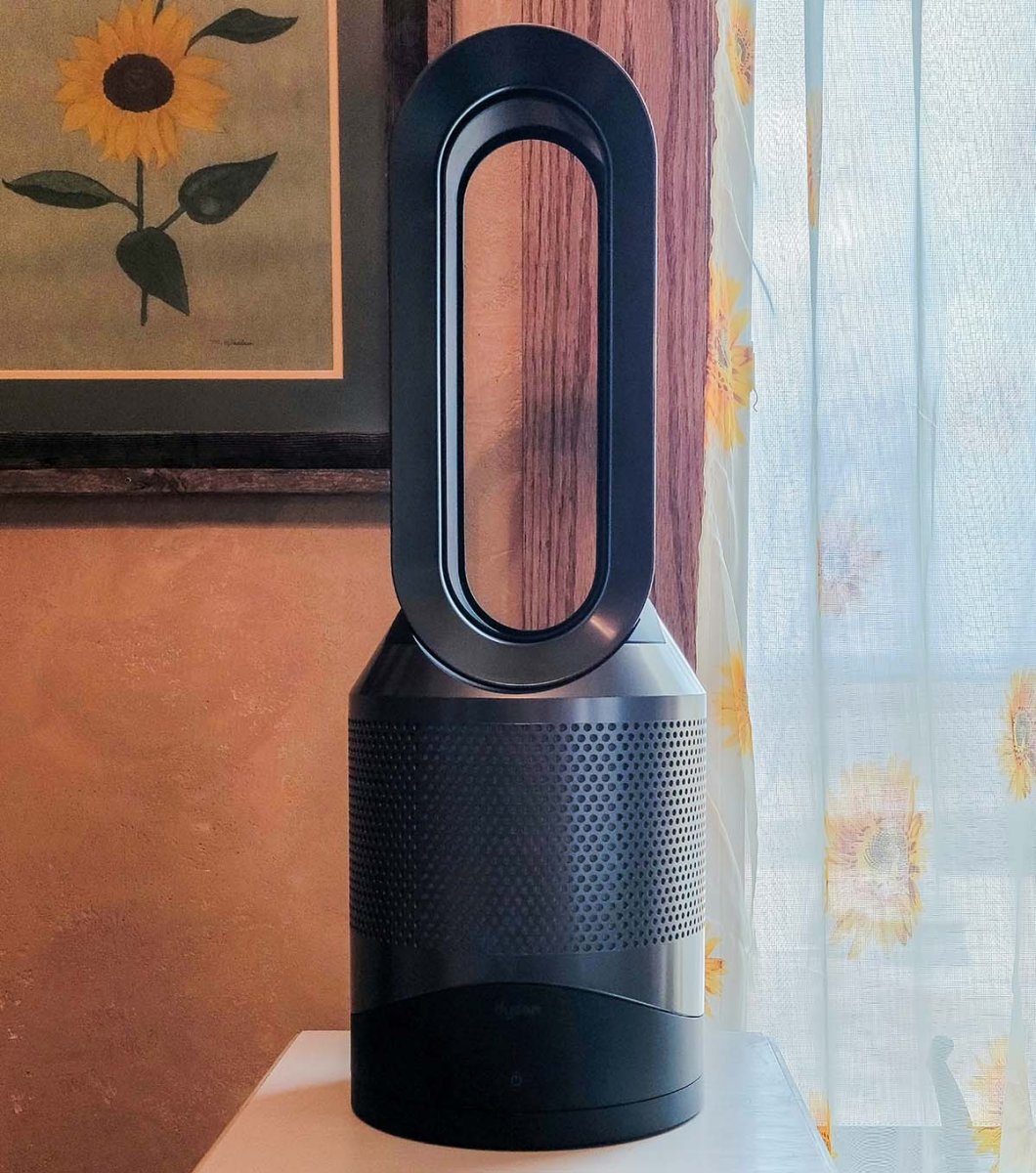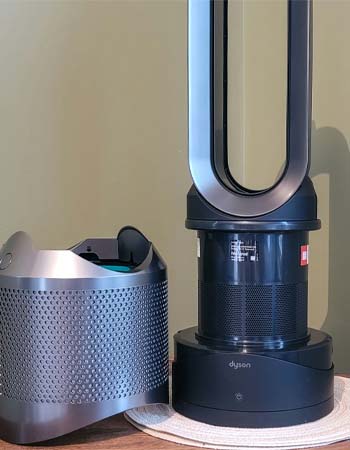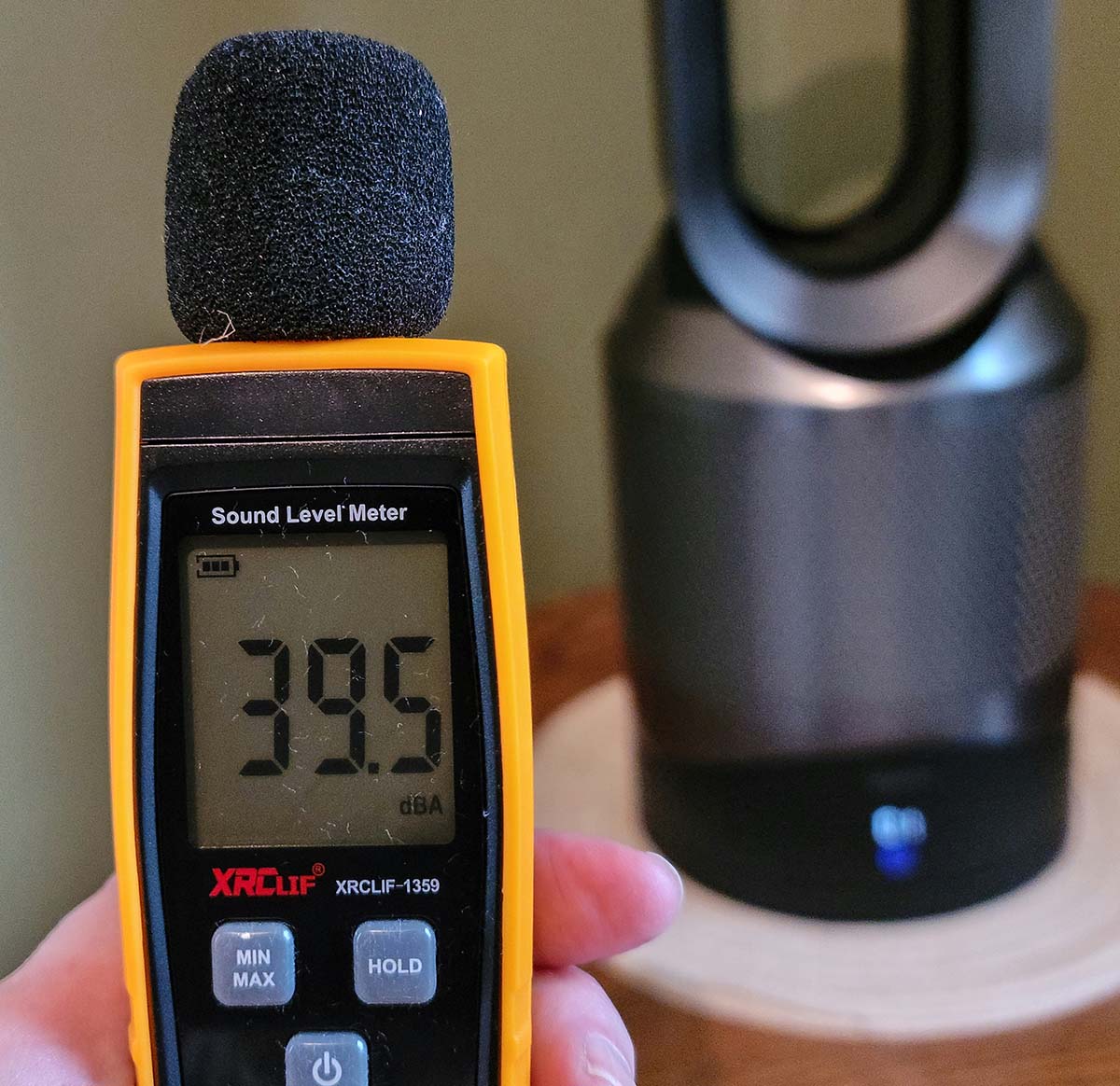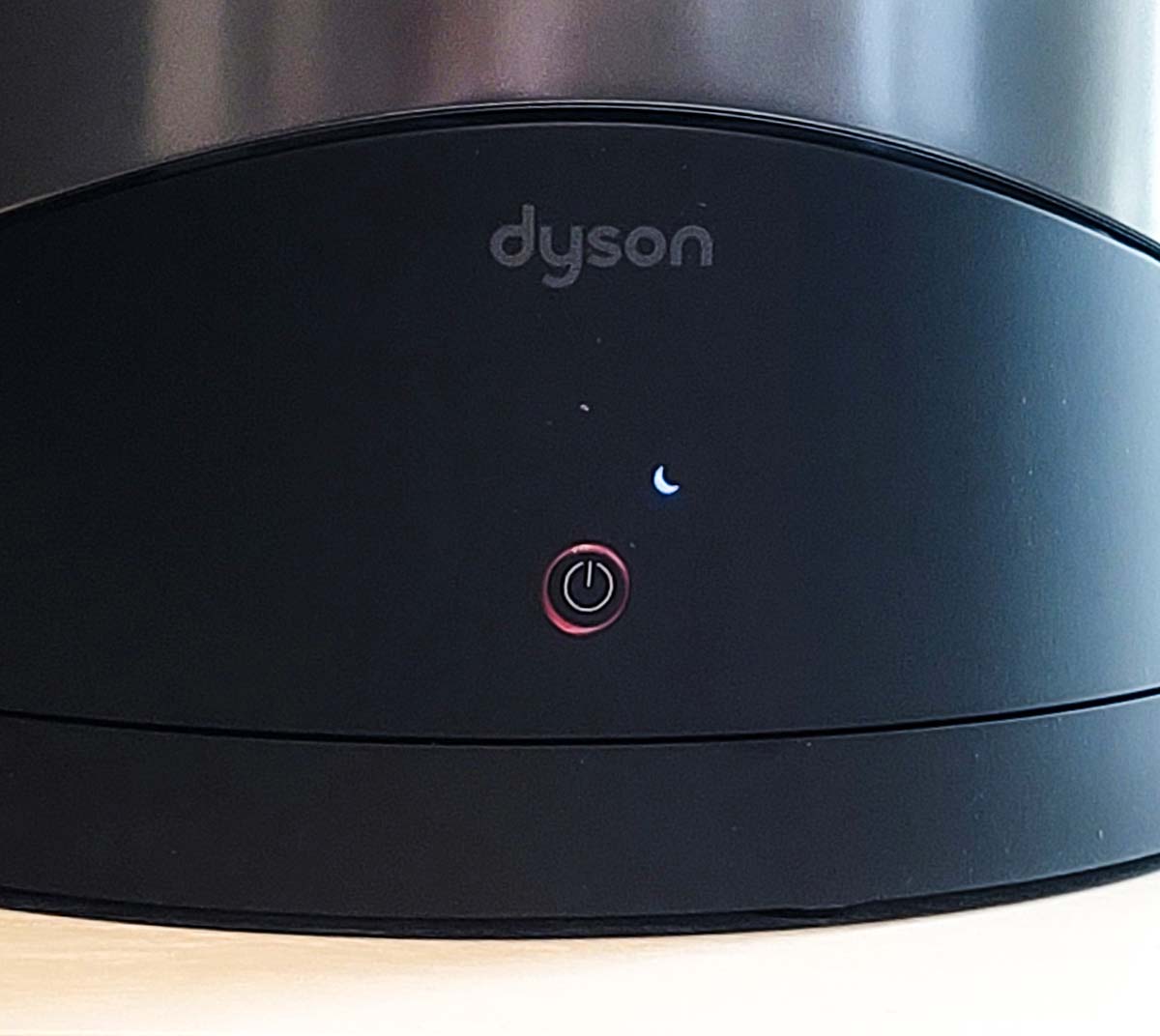

We may earn revenue from the products available on this page and participate in affiliate programs. Learn More ›
Offensive odors, fumes, dust, and pollen are common pollutants in many homes, but we don’t have to accept dirty air. Air purifiers are designed to remove pollutants from indoor air, and they’re available from dozens of manufacturers. Leading household-appliance brand Dyson makes several air purifier models, and I had the opportunity to try out what has been touted as among the best on the market, the Dyson Pure Hot+Cool air purifier.
I wanted to know just how effective today’s top air purifiers are at cleaning indoor air, so I tested the best air purifiers and used an air quality monitor to check their efficiency. The following Dyson air purifier review offers an in-depth look at this specific Dyson model. Learn the pros and cons of this air purifier, and find out how it fared in my hands-on tests.
The Dyson Air Purifier: At a Glance

Rating: 7.5/10
PROS
- Air purifier offers heating as well as air purification functions
- Good distribution of purified air as a result of its ability to oscillate (turn from side to side)
- Removes several types of airborne toxins, including VOCs and particulates
CONS
- Name of the product indicates cooling, but the Dyson air purifier does not cool the air
- The MyDyson app did not recognize or sync with my wireless network
- Expensive; for half the cost of the Dyson, users could purchase both an air purifier and a space heater individually
Get the Dyson Pure Hot+Cool air purifier at Amazon for $599.99.
What is the Dyson air purifier?
The Dyson air purifier removes a range of pollutants. It features a high-efficiency particulate air (HEPA) Glass 360 filter rated to remove up to 99.97 percent of allergens as small as 0.3 microns. For comparison, a human hair is approximately 100 microns thick.
The purifier also features a heating element, which makes it more comfortable to use in cold rooms. While the name of the purifier includes the word “cool,” this Dyson model does not actively cool the air in the same way an AC unit does. It does, however, have a fan that can be used to circulate the air in a room, which can mimic the feeling of a cool breeze.
One of the air purifier’s more notable features is its sleek, trendy design that complements virtually any decor. Shoppers who care about aesthetics might find this to be the right air purifier for them—but don’t buy it just yet.
How easy or challenging is it to set up the Dyson air purifier?
The manual setup of the Dyson air purifier couldn’t be more straightforward—all I had to do was take it out of its box, slip off the protective plastic covering, and plug it in. It comes with a self-explanatory remote control to turn the unit on and off and select from its multiple modes, including heating, oscillating, and power level. I also programmed the air purifier to run for a set time before shutting off. Unlike other air purifiers I tested, which required disassembling the units to remove a plastic wrap from the filter before use, the Dyson came ready to go.
Yet while setup was simple on an analog level, things got frustrating when I tried to go wireless with it. The Dyson air purifier also features connectivity, and I was looking forward to testing that aspect since many of the appliances in my home are connected to my wireless network. No such luck. I downloaded the MyDyson app for Android on my smartphone and followed the step-by-step installation procedure. The app would not recognize my wireless network. I even tried deleting the app twice and reinstalling it, but it failed again. That was disappointing, since I was anticipating using the purifier’s voice controls via Alexa.
How well does the Dyson air purifier remove pollutants?
Though I don’t have access to a scientific laboratory, with a little ingenuity I was able to devise a reliable system for testing the air purifiers. I put them (one at a time) in a closet, along with an air quality monitor. I then introduced airborne particulates by shaking a dirty rug over the purifier. Next I turned it on, closed the closet door, and let it do its thing. I periodically checked on the purifier’s progress by opening the door and taking a reading on the monitor. It took the Dyson air purifier about 1 hour to remove enough of the particulates for the air to reach a safe level, as indicated by the monitor.
I tested its smoke-removal function by lighting five incense sticks and letting them fill the closet with smoky odor. Once again, it took the Dyson about 1 hour to remove enough fumes to freshen the air inside the closet to a safe level. This was similar to the results I got with some of the other models I tested, but the Dyson wasn’t among the top performers as it did not remove the smoke and odors or airborne particulates as quickly as some of the other models. That said, I do consider this Dyson to be a healthy addition to a home if it’s allowed to run continuously to keep the air clean in small to midsize rooms.

How loud is the air purifier when it’s running?
Fresh air is great, but loud air purifiers can be distracting, which can cause users to turn them off. I used a digital decibel tester to determine how loud the air purifiers were on different operating modes.
When running on High, the Dyson air purifier generated 53 decibels, which I measured at 3 feet away from the unit. That’s comparable to the sound of moderate rainfall. For me, it was slightly annoying when I paid attention to it at first, but I was able to tune out its humming sound after a few minutes. On Low, the Dyson generated just 38 decibels, which is similar to the sound of a whisper, and it was easy to overlook that noise level. When the Sleep mode was activated, my decibel tester didn’t pick up any sound louder than the ambient sounds in my house.
Ultimately, it’s up to the individual whether 38 or 53 decibels will be disruptive. If the house has a lot of other background noises, the sound of the Dyson might not even be noticeable. On Sleep mode, it shouldn’t be distracting, and it might even seem similar to white noise, promoting better sleep.

Is the Dyson air purifier worth the money?
As of this writing, the Dyson air purifier sells for $599.99 at Amazon. That’s pretty steep for an air purifier, as comparable models run between $350 and $450. Additionally, the Dyson didn’t remove pollutants from the air as quickly as some of the other models I tested.
Still, it has some notable upsides. The filter is relatively simple to remove and replace. When it’s time for a new replacement filter, the old one is a snap to take out by depressing buttons on either side of the perforated bottom case and pulling upward. The case slides up and off with ease. The user only needs to slide the old filter out, slide the new one in, and put the case back on the base unit.
The remote control makes it easy to operate the Dyson air purifier, and since it’s magnetic it sticks to the top of the air purifier without falling off. If it works with Wi-Fi, that would add another value point, but since that was not the case for me, I can’t verify whether the app is beneficial.
So is it worth the high price tag? Those looking for a sleek combo unit that incorporates heat generation might be able to justify the high cost of Dyson air purifiers. I think I’d choose a less expensive but more efficient model, such as the Shark air purifier, and then buy a space heater to use for warmth as needed.
Where to Buy the Dyson Air Purifier
Get the Dyson Pure Hot+Cool air purifier at Amazon for $599.99.
Meet the Tester
Glenda Taylor is a product tester and writer specializing in construction, remodeling, and real estate. She and her husband own a general contracting company, and she is experienced in both residential and commercial building applications. She tests a wide range of power tools as well as other home improvement, household, and lawn-and-garden products.
